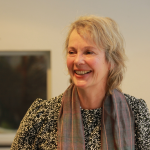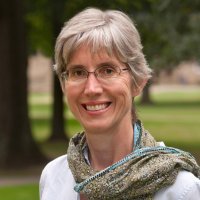
Dr. Siobhan Fennessy
Professor of Environmental Studies & Biology, Kenyon College
Biography
Siobhan Fennessy, hailing from the Midwestern United States, discovered her passion for nature during childhood adventures in neighborhood ravines. These formative experiences laid the groundwork for her future career in environmental science. A transformative canoe trip through the Okeefenokee Swamp solidified her resolve to study biology, setting her on a path of exploration and discovery.
Fennessy's academic journey was marked by unconventional choices, which ultimately shaped her into a trailblazer in the field of wetland science. Under the mentorship of Dr. Bill Mitsch, she delved into researching wetlands' efficacy in treating acid mine drainage, a critical environmental issue in southeastern Ohio. This pioneering work laid the foundation for her Ph.D. studies at Ohio State University, where she immersed herself in wetland restoration ecology.
In 1991, Fennessy embarked on an international adventure, joining University College London and the Station Biologique de la Tour du Valat in France. Here, she delved into interdisciplinary research, exploring wetland ecology and conservation under the mentorship of Luc Hoffman, a renowned ornithologist and environmental philanthropist. Returning to the United States, Fennessy continued her impactful work at the Ohio Environmental Protection Agency, where she spearheaded initiatives in wetland ecology and policy. Her collaborations with esteemed colleagues, including Dr. Mary Kentula and Dr. Denice Wardrop, further enriched her scientific journey.
In 1998, Fennessy transitioned to academia, joining Kenyon College as a faculty member. Here, she found fulfillment in mentoring students and conducting research at the intersection of science and policy. Her dedication to teaching and inspiring future generations of environmental stewards remains a cornerstone of her legacy. Fennessy's contributions extend beyond academia. She has been actively involved in international wetland conservation efforts, serving on committees for the Ramsar Convention and advocating for the protection of vital ecosystems worldwide.
As she reflects on her career, Fennessy emphasizes the importance of collaboration and interdisciplinary thinking in addressing environmental challenges. She envisions a future where wetlands play a central role in sustainable solutions, and she continues to champion their preservation with unwavering passion and dedication.
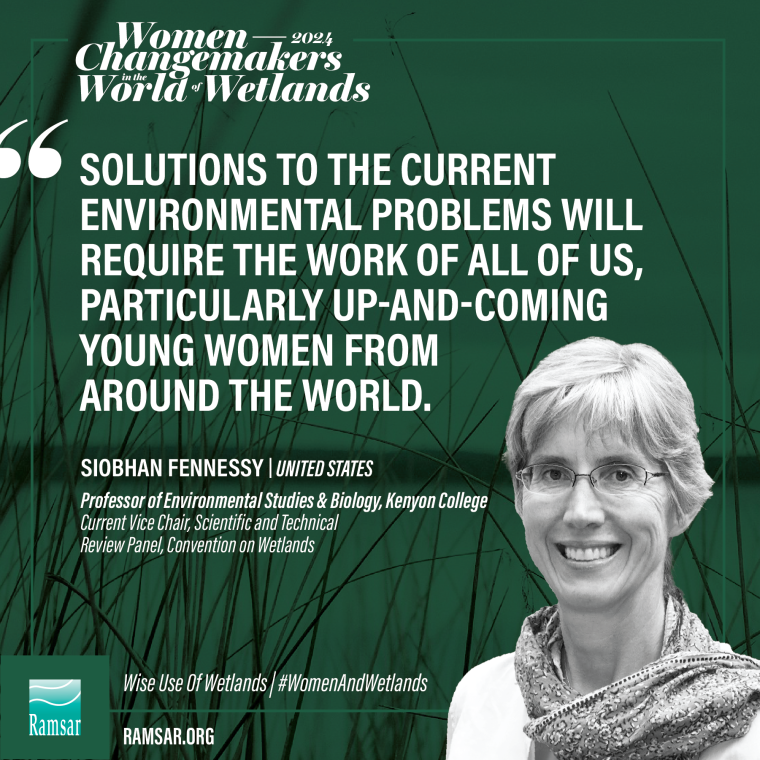
Questions and Answers
What personal experience has shaped or inspired your journey?
Looking back, I realize the role my parents played in shaping my journey. My mother was an armature botanist who found beauty in plants, and importantly this extended to the ones that grow in the alleyways and abandoned lots of cities – I learned that nature can be found everywhere! I’ve never lost that sense of wonder. My father was a mathematician turned writer who helped me understand the value of data-driven science, and even more importantly, to communicating it.
Much later, my work at a large experimental wetland restoration project was profoundly influential. It was a novel experiment where different hydrological treatments could be established in restored riparian wetlands, allowing us to track the effects of hydrology on ecosystem recovery. Wetland restoration remains a focus of my work, and my thinking was shaped by Anthony Bradshaw, the British ecologist who wrote “The acid test of our understanding is not whether we can take ecosystems to bits on pieces of paper, however scientifically, but whether we can put them together in practice and make them work” (Bradshaw 1983). Restoration is the perfect mix of basic and applied science, which makes it a delightful challenge.
Who is the influential figure who has inspired your actions, and what specifically about them has been motivating?
I received my Ph.D. from the Ohio State University under Prof. William Mitsch, one of the leading wetland ecologists, and a true systems thinker. His mentorship in systems ecology and seeing the ‘big picture’ was inspiring. I learned the role of wetlands in the landscape, the ways in which wetlands are ‘hubs’ that connect water and species, the benefits that conservation and restoration of wetlands can provide, and the fact that humans are part of nature (we are a part of, not apart from, nature). This began my work on the conservation and wise use of wetlands.
Many others have been inspiring and I have benefitted from the wisdom of different mentors over time. Working at the Wetlands Research Unit at University College London as well as under Luc Hoffman at Tour du Valat inspired my dedication to the work of the Ramsar Convention and the vital work it does. Collaborators such as Dr. Mary Kentula (USEPA), Dr. Barbara Bedford (Cornell University) and Dr. Denice Wardrop (Penn State University) were instrumental as collaborators and demonstrated the cooperative nature of wetlands work. Finally, my students, who have gone on to be amazing women in wetlands themselves, have inspired me to be at my best.
In your conservation efforts for wetlands, what key challenges did you face and how has this experience fuelled your dedication to making a positive impact?
I have a photo on my wall, taken about 20 years ago, that shows all the participants who had given talks at a wetland symposium. Of the 12 people in the photo, 11 were older men and I was a young woman scientist. In meeting other women ecologists through the years I have learned that many of us have a similar version of this photo! This illustrates the scarcity of role models, which present barriers to entry. Over time, I learned the value of perseverance and seeking out women who could serve as mentors to me. They became integral to my success.
Looking forward, I can also see one of my greatest impacts has been mentoring the generations of women students who have gone on to be influential wetland leaders themselves. This multiplies upon itself; these women are now role models and mentors for new generations of scientists, conservationists, and practitioners. Slowly we are changing the face of science to offer more opportunities and be more inclusive and inspiring.
All women in this category : Wise Use of Wetland
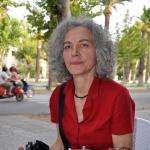
Gordana Beltram
National Coordinator 2014-2022 Ministry of the Environment and Spatial Planning Slovenia.
More information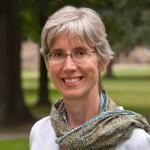
Dr. Siobhan Fennessy
Professor of Environmental Studies & Biology, Kenyon College
More information
Ximena Giraldo
Senior Advisor in Economy, Trade and Finance Embassy of the Kingdom of the Netherlands
More information